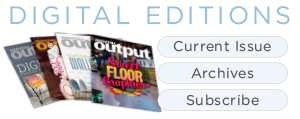By Olivia Cahoon
Digital print addresses a previously overlooked segment in packaging. Certain providers struggle to offer smaller volumes. Short runs are cost prohibitive for manufacturing companies running analog technologies. Alternatively, these same size projects may be too large for smaller print shops. This gap gives digital print service providers (PSPs) a new opportunity to meet a unique demand.
Rapid Prototypes
Founded in 2003 in Bentonville, AR, Rapid Prototypes, LLC started with three employees. The company was established to provide display prototypes including pallet displays, product trays, sidekicks, and some primary packaging in corrugate. When it began, the shop served the Northwest AR area for clients associated with big box stores like Walmart or Sam’s Club and produced around 500 square feet in materials per week.
Today Rapid Prototypes has 41 employees and offers a range of packaging—corrugate and flexible, and displays in a multitude of finishes including metallic inks, white inks, and spot varnish effects. The company roughly runs 30,000 square feet of material per week for clients both on a national and international level while shipping prototypes across the world.
“Our volume increased significantly. In the beginning it would take us a week to produce one pallet display, now it takes us less than two hours,” says Kyle Jack, owner, Rapid Prototypes.
Packaging Made Perfect
100 percent of the company’s work is packaging and display. According to Jack, Rapid Prototypes creates nearly every type of packaging; from corrugated boxes and displays to PETG, flexible polybags, shrink film, thermoform, and even large displays for trade shows.
Rapid Prototypes also offers emergency packaging services and short-run production for clients with quick packaging needs. These products are often displays and prototypes for meetings with major retail buyers.
Rapid Prototypes uses a multitude of roll-fed printers including the Epson SureColor S70670, HP, Inc. Designjet Z6800, Mimaki USA, Inc. JV5-160S, and Roland DGA Corporation VersaUV LEC-330 in addition to four Esko Kongsberg cutting tables, laminators, and other small devices.
In 2015, the company purchased a Durst Image Technology US, LLC Rho P10 250 HS Plus flatbed printer to replace a previous model. “We were very happy with that machine and the service that Durst provided us over the years, as well as its willingness to work with a startup company with a very small budget at the time,” offers Jack.
In the packaging market, he sees trends towards high-end finishes like spot varnish and metallic in addition to shorter and more variable data runs.
Short-Run Holiday Packaging
In 2016, repeat customer Hughes Design Group—a strategic branding company—approached Rapid Prototypes for a holiday gift packaging project. It requested holiday-themed packaging for a packaging set with multiple components. Burlap sacks were used for one portion of the packaging.
Rapid Prototypes printed 60 custom burlap bags on the Durst Rho P10 250 HS Plus. The bags featured Winter graphics including text and scenic images, but were just one piece of a complete packaging set. The bag held a custom printed popcorn box, hat box, and gift tags.
From job submittal to installation, the holiday gift packaging took two weeks to complete. Jack says this particular packaging job was unique because of the printing materials used and all of the different pieces involved, which required custom printing and building as well as hard-to-source materials.
Personalized Innovation
Packaging is a broad term that includes flexible packaging and polybags to corrugated board, thermoform, and PETG packaging. Regardless of the type, print providers like Rapid Prototypes utilize digital print technology to provide clients with personalization and shorter turnaround times for all packaging needs.
Oct2017, Digital Output



